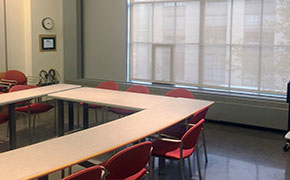Instructor Insights pages are part of the OCW Educator initiative, which seeks to enhance the value of OCW for educators.
Course Overview
This page focuses on the course 4.S67 Landscape Experience: Seminar in Land/Art as it was taught by Dr. Rebecca K. Uchill and Professor Caroline Jones in Fall 2016.
This seminar explored “land” as a genre, theme, and medium of art and architecture of the last five decades. Focusing largely on work in the United States, the course sought to understand how the use of land in art and architecture is bound into complicated entanglements of property and power, the inheritances of non-U.S. traditions, and how the term “landscape” is variously deployed in the service of a range of political and philosophical positions.
Students had the opportunity to participate in a pre-term field trip to experience the use of land art and architecture in the American Southwest.
A final research paper or project equivalent was the capstone of the course.
Course Outcomes
Course Goals for Students- Understand that landscape is everywhere, and is a construct of our (and others’) subjectivities.
- Understand that "landscape" is both contested and political.
- Use immersive fieldwork to reflect on the kinds of sensorial experiences that allow us to know something as a landscape.
- Explore how the work of artists, architects, and writers on art and architectural theory can offer rich insights into the tangled nexus of phenomenology, pilgrimage, and property development that has been conjured by landscape, in history and at present.
Documentation can't convey the full contours of experiences—the wind, the smells, the scale, the memories, and so on.
—Dr. Rebecca Uchill
In the following pages, Dr. Rebecca Uchill describes various aspects of how she taught 4.S67 Landscape Experience: Seminar in Land/Art.
Curriculum Information
Prerequisites
Instructor permission required
Requirements Satisfied
Elective
Offered
Not offered regularly
Assessment
The students' grades were based on the following activities:
 25% Participation (including seminar presentations and MIT List Visual Arts Center lecture presentations)
25% Participation (including seminar presentations and MIT List Visual Arts Center lecture presentations) 75% Capstone project (proposal, in-class presentation, final write-up)
75% Capstone project (proposal, in-class presentation, final write-up)Student Information

Breakdown by Year
Mostly graduate students
Breakdown by Major
Mostly the MIT Program in Art, Technology, and Culture (ACT), Master of Architecture (MArch), and History, Theory and Criticism of Architecture and Art (HTC)
During an average week, students were expected to spend 12 hours on the course, roughly divided as follows:
In Class
- Met 1 time per week for 3 hours per session; 12 sessions total; mandatory attendance.
- Students were assigned specific weeks in which they worked as a team to present a guiding question or questions to tie together the assigned readings and to orient the class discussions.
- The List Visual Arts Center annual Lavine Lecture was programmed in explicit connection with the course and students worked together to create a visually dynamic 10-minute presentation during the public lecture.
Out of Class
Students completed assigned readings, prepared for in-class presentations and the Lavine lecture, and worked on their capstone projects.
Semester Breakdown
| WEEK | M | T | W | Th | F |
|---|---|---|---|---|---|
| 1 |  |
 |
 |
 |
 |
| 2 |  |
 |
 |
 |
 |
| 3 |  |
 |
 |
 |
 |
| 4 |  |
 |
 |
 |
 |
| 5 |  |
 |
 |
 |
 |
| 6 |  |
 |
 |
 |
 |
| 7 |  |
 |
 |
 |
 |
| 8 |  |
 |
 |
 |
 |
| 9 |  |
 |
 |
 |
 |
| 10 |  |
 |
 |
 |
 |
| 11 |  |
 |
 |
 |
 |
| 12 |  |
 |
 |
 |
 |
| 13 |  |
 |
 |
 |
 |
| 14 |  |
 |
 |
 |
 |
| 15 |  |
 |
 |
 |
 |
| 16 |  |
 |
 |
 |
 |
 No classes throughout MIT
No classes throughout MIT Lecture session
Lecture session Student Presentations
Student Presentations Assignment due date
Assignment due date No class session scheduled
No class session scheduled Field Trip
Field Trip Lavine Lecture
Lavine Lecture

 Room 1 of 1
Room 1 of 1 